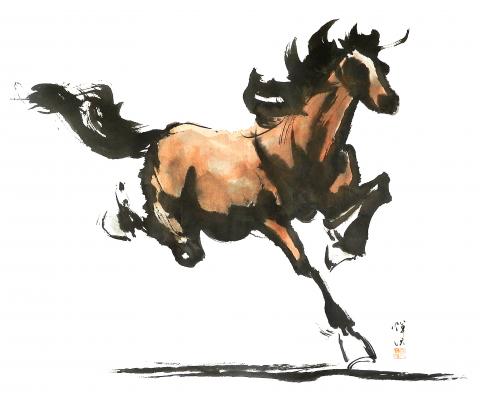The Year of the Horse has banished the Year of the Snake, bringing with it improved fortunes for Taiwan, according to a top astrologer in Taipei.
Last year, celebrity astrologer Wisdom Tsai (蔡上機) predicted — not inaccurately, he boasts — a Year of the Snake plagued by political instability and economic stagnation.
Only some of the snake year’s undesirables will extend into 2014, according to this year’s reading. For instance, bribery will be serious in the upcoming seven-in-one elections; vice and corruption in general will continue to mark statesmen of all stripes.

Photo Courtesy of Wisdom Tsai
“Politicians should beware of their scandals being exposed,” Tsai says ominously, adding that other events to take heed of are earthquakes above a 6 on the Richter scale, plane crashes and freak lightning accidents, as well as infectious diseases of the lung, brain and colon.
But all in all, things are looking up this year.
“In 2014, there’s going to be a highly apparent turn for the better and we will walk out of the valley of 2013,” Tsai says.

Illustration: Ho Huei-tse
Tsai is an astrologer who divines by carefully tracking a cluster of nine stars. Every Lunar New Year, the stars change position, so that each year the earth is subject to a different combination of celestial forces.
This year, the stars that signify wealth, storehouses and nobility have clustered, boding some better times ahead. Tsai predicts that in 2014, inflows of foreign hot money and real-estate investment will send the TAIEX, the local bourse, past 9,200 points.
Approval ratings for President Ma Ying-jeou (馬英九) could rally, too, though perhaps without a heroic presidential effort.
“Because the fortunes of Taiwan are improving, Ma Ying-jeou does not need to do much. He can simply sit back and reap the harvest and see his approval ratings go up, so long as he doesn’t act perversely and create damaging policies,” Tsai said.
Finally, a break for snakes
It is an equally positive year for all Taiwanese, but due to the unique attributes of the individual zodiac signs, some animals are more equal than others.
Tsai, in a popular form of zi wei dou shu (“purple star astrology,” 紫微斗數), interprets the individual destinies of the 12 zodiac animals by using variables such as their year and month of birth.
According to a compilation of individual horoscopes provided by the author, the rooster is set to have a sparkling year.
“For the rooster, this is a year filled with the act of savoring, enjoyment, the love of the stage, performance and making friends. Your relationships will be much enhanced, and besides obtaining more opportunities to interact with the wealthy elite, you will often have chances to participate in high-level upper-class social circles, fashionable parties and the gatherings of aristocrats and princelings,” Tsai writes in a chart-filled volume titled 2014 Ta Kai Yun (Interpreting Destinies of 2014, 2014大開運).
Others with very rosy prospects include the under-loved snake, who could finally win some big prizes and affirmation this year; the pig, which is poised to make courageous entrepreneurial strides; and the tiger, which could prove itself invaluable to its company and family.
Meanwhile, the dog is tipped for glory. He will become more abstract in his thinking and artistic in his temperament this year, and as a result, is liable to make brisk advances if he works in fields like pathology, pharmacology, aeronautics, philosophy, biotechnology research and development, invention and creative design.
Some animals are fated to be less blessed. The horse, whose sign clashes with this year’s Tai Sui (太歲), will need to control a tendency to overspend.
The rat could encounter parents or bosses who are impediments to progress, particularly if the parents or bosses were born in the year of the ox or the dragon. As a direct consequence, the rat might toil tirelessly but have little to show for it.
Feng Shui On Taiex
Whatever their prospects in the Year of the Horse, all zodiac animals can take heart: There are ways to adjust bad fortune, and even to better a fortune that is already fine.
Tsai’s advice? Fengshui in the office or home can be brought to their optimal state by incorporating the colors of blue, green or cyan, since these colors interact with this year’s dominant star in a positive way.
In the Year of the Horse, the dominant influence on earth is the fourth star of the constellation, which carries the element of wood. Energy from this fourth star interacts with the energy of the earth to create five different kinds of qi (氣), some positive and some negative.
People can encourage a positive chi, wang qi (旺氣), by gathering certain objects, which this year includes living plants, wood and especially ancient sandalwood (檀木). Other elements are colors like blue, and numbers that end in 3 or 8, he says.
Financially, 2014 looks good, but Tsai has a few tips for getting especially lucky.
He predicts that dips in the TAIEX will occur in February, June and late September. The market should enjoy a nice surge in the first half of the year, with a peak in March that could challenge the 9,200-point mark, and other highs in July and November.
Investors can take advantage of the positive sentiment by buying up stocks in solar power and flat panel displays, but should stay on the alert for a sharp fall. Other hot stocks are in the financial sector, cultural and creative industries, marketing, advertising, entertainment and high-end consumer services.
“Stocks in the high-tech industry, information and communications design and 3D printing are going to be a home run,” he says.
Is it a good time to buy a house? Not quite — now is the time to sell, counsels the astrologer.
“The real-estate market is at its peak and has been bullish for years, but the bubble is about to burst,” he says.
“The real-estate market is about to turn downward, so it’s the last chance for sellers and investors to get out of the market … If they don’t, their assets will be locked.”
House-hunters should cool their heels, perhaps hold off another year for a down market.
“In 2015, the real-estate market will obviously be stepping into a recession,” he says.

The canonical shot of an East Asian city is a night skyline studded with towering apartment and office buildings, bright with neon and plastic signage, a landscape of energy and modernity. Another classic image is the same city seen from above, in which identical apartment towers march across the city, spilling out over nearby geography, like stylized soldiers colonizing new territory in a board game. Densely populated dynamic conurbations of money, technological innovation and convenience, it is hard to see the cities of East Asia as what they truly are: necropolises. Why is this? The East Asian development model, with

June 16 to June 22 The following flyer appeared on the streets of Hsinchu on June 12, 1895: “Taipei has already fallen to the Japanese barbarians, who have brought great misery to our land and people. We heard that the Japanese occupiers will tax our gardens, our houses, our bodies, and even our chickens, dogs, cows and pigs. They wear their hair wild, carve their teeth, tattoo their foreheads, wear strange clothes and speak a strange language. How can we be ruled by such people?” Posted by civilian militia leader Wu Tang-hsing (吳湯興), it was a call to arms to retake

This is a deeply unsettling period in Taiwan. Uncertainties are everywhere while everyone waits for a small army of other shoes to drop on nearly every front. During challenging times, interesting political changes can happen, yet all three major political parties are beset with scandals, strife and self-inflicted wounds. As the ruling party, the Democratic Progressive Party (DPP) is held accountable for not only the challenges to the party, but also the nation. Taiwan is geopolitically and economically under threat. Domestically, the administration is under siege by the opposition-controlled legislature and growing discontent with what opponents characterize as arrogant, autocratic

When Lisa, 20, laces into her ultra-high heels for her shift at a strip club in Ukraine’s Kharkiv, she knows that aside from dancing, she will have to comfort traumatized soldiers. Since Russia’s 2022 invasion, exhausted troops are the main clientele of the Flash Dancers club in the center of the northeastern city, just 20 kilometers from Russian forces. For some customers, it provides an “escape” from the war, said Valerya Zavatska — a 25-year-old law graduate who runs the club with her mother, an ex-dancer. But many are not there just for the show. They “want to talk about what hurts,” she